Cairo (CNN) -- Egyptian President Mohamed Morsy didn't back off the controversial edict he issued or Egypt's upcoming constitutional referendum, saying Thursday night that he respects peaceful opposition to his decisions but won't stand for violence.
Addressing "those who oppose me" and his supporters, Morsy condemned those involved in recent clashes -- referring specifically to those armed with weapons and who are backed and funded by members of the "corrupt ... ex-regime" -- and promised they'd be held accountable.
"(They) will not escape punishment," the president said in a televised speech.
Morsy's words not only failed to mollify many protesters on the streets, it further enraged them. Activists camped in Cairo's Tahrir Square chanted "Leave! Leave! Leave!" as the president talked.
.cnnArticleGalleryNav{border:1px solid #000;cursor:pointer;float:left;height:25px;text-align:center;width:25px} .cnnArticleGalleryNavOn{background-color:#C03;border:1px solid #000;float:left;height:25px;text-align:center;width:20px} .cnnArticleGalleryNavDisabled{background-color:#222;border:1px solid #000;color:#666;float:left;height:25px;text-align:center;width:25px} .cnnArticleExpandableTarget{background-color:#000;display:none;position:absolute} .cnnArticlePhotoContainer{height:122px;width:214px} .cnnArticleBoxImage{cursor:pointer;height:122px;padding-top:0;width:214px} .cnnArticleGalleryCaptionControl{background-color:#000;color:#FFF} .cnnArticleGalleryCaptionControlText{cursor:pointer;float:right;font-size:10px;padding:3px 10px 3px 3px} .cnnArticleGalleryPhotoContainer cite{background:none repeat scroll 0 0 #000;bottom:48px;color:#FFF;height:auto;left:420px;opacity:.7;position:absolute;width:200px;padding:10px} .cnnArticleGalleryClose{background-color:#fff;display:block;text-align:right} .cnnArticleGalleryCloseButton{cursor:pointer} .cnnArticleGalleryNavPrevNext span{background-color:#444;color:#CCC;cursor:pointer;float:left;height:23px;text-align:center;width:26px;padding:4px 0 0} .cnnArticleGalleryNavPrevNextDisabled span{background-color:#444;color:#666;float:left;height:23px;text-align:center;width:25px;padding:4px 0 0} .cnnVerticalGalleryPhoto{padding-right:68px;width:270px;margin:0 auto} .cnnGalleryContainer{float:left;clear:left;margin:0 0 20px;padding:0 0 0 10px}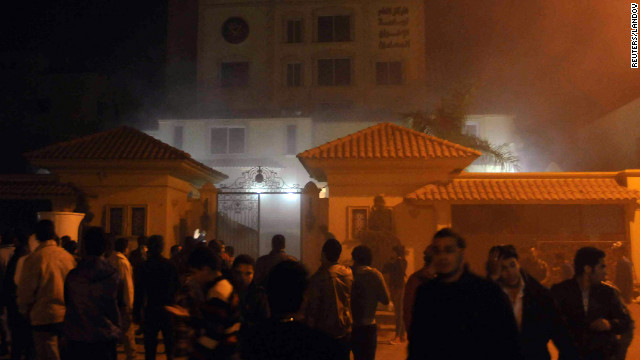 Protesters angry over Egyptian President Mohamed Morsy's decisions giving himself unchecked powers surround the Muslim Brotherhood's headquarters in Cairo after starting a fire inside the compound on Thursday, December 6. Riot police form a line as anti-Morsy protesters surge around the Muslim Brotherhood's headquarters in Cairo on December 6. An anti-Mohamed Morsy protester shouts during a march to the presidential palace in Cairo, Egypt, on December 6. Protesters are blocked from approaching the the presidential palace by the Egyptian army on December 6 in Cairo. Egyptian soldiers stand outside the presidential palace in Cairo after setting up barbed wire barricades on December 6. Supporters of Morsy clash with anti-Morsy protesters outside the Egyptian presidential palace on Wednesday, December 5, in Cairo. Members of the Muslim Brotherhood and Morsy supporters destroy tents of anti-Morsy protesters outside the presidential palace on December 5. Morsy supporters carry an injured man to safety during clashes with anti-Morsy demonstrators on a road leading to the Egyptian presidential palace on December 5. Members of the Muslim Brotherhood and supporters of Morsy clash with anti-Morsy demonstrators on a road leading to the Egyptian presidential palace on December 5. Egyptian riot police stand behind barbwire as thousands of Egyptian demonstrators march to the presidential palace in Cairo, Egypt, on Tuesday, December 4. Tens of thousands of demonstrators encircled the presidential palace in Cairo after riot police failed to keep them at bay with tear gas on December 4. An Egyptian woman waves a national flag as demonstrators march to the presidential palace in Cairo on December 4. A Morsy supporter waves a flag outside the Supreme Constitutional Court as hundreds of supporters of the president protest on Sunday, December 2, in Cairo, forcing judges to postpone a hearing on a constitutional panel at the heart of a deepening political crisis. Supporters of Morsy pray outside the Supreme Constitutional Court on December 2. A man kisses a portrait of Morsy during a gathering of thousands of Islamists in front of Cairo University on Saturday, December 1. Thousands pray during a rally in support of Morsy in front of Cairo University on December 1. An Egyptian man delivers a speech as protesters gather in Cairo's Tahrir Square on Friday, November 30. A man shouts as protesters gather in Tahrir Square on November 30. A man holds a copy of the Quran and a cross in Tahrir Square on November 30. Protesters run from Egyptian riot police during clashes near Cairo's Tahrir Square on Wednesday, November 28. A protester carries a rock during clashes with police on Wednesday. Egyptians carry a giant national flag as tens of thousands take part in a mass rally in Cairo on Tuesday, November 27, against a decree by President Mohamed Morsy granting himself broad powers. An Egyptian protester holds up a Quran and a figure of Christ on the cross during Tuesday's demonstration. Protesters continue to rally in Tahrir Square on Tuesday. An Egyptian protester attempts to throw back a tear gas canister on Tuesday during clashes with riot police in Omar Makram Street, off Tahrir Square. Activists in Cairo's Tahrir Square on Monday, November 26, carry the coffin of Gaber Salah, an activist who died overnight after he was critically injured in clashes in Cairo. Salah, a member of the April 6 movement known by his nickname "Jika," was injured last week during confrontations between police and protesters on Cairo's Mohammed Mahmud street. Thousands of activists attend the funeral of Gaber Salah on Monday. Protesters clash with Egyptian police at Simon Bolivar Square on Sunday, November 25, in Cairo. Egypt's powerful Muslim Brotherhood called nationwide demonstrations in support of Islamist President Mohamed Morsy in his showdown with the judges over the path to a new constitution. Egyptian protesters hurl stones at police at Tahrir Square on Sunday. Protesters gather at sit-in tents in Tahrir Square on Sunday. Egyptian President Mohamed Morsy waves to supporters in front of the presidential palace in Cairo on Friday, November 23. Thousands of ecstatic supporters gathered outside the presidential palace to defend their leader against accusations from rival protesters that he has become a dictator. Morsy supporters gather outside the presidential palace in Cairo on Friday. Morsy insisted that Egypt was on the path to "freedom and democracy," as protesters held rival rallies over sweeping powers he assumed that further polarized the country's political forces. Protesters demonstrating against Morsy run from tear gas fired by Egyptian riot police during clashes in Cairo's Tahrir Square on Friday. Egyptian protesters throw rocks toward riot police on Friday Egyptian supporters and opponents of Morsy clash in the coastal city of Alexandria on Friday. A man throws a rock during clashes in Alexandria on Friday. Thousands of demonstrators march through the streets of Cairo to protest against Morsy on Friday. Clashes rocked the coastal city of Alexandria on Friday. Egyptians protest over presidential powers Egyptians protest over presidential powers Egyptians protest over presidential powers Egyptians protest over presidential powers Egyptians protest over presidential powers Egyptians protest over presidential powers Egyptians protest over presidential powers Egyptians protest over presidential powers Egyptians protest over presidential powers Egyptians protest over presidential powers Egyptians protest over presidential powers Egyptians protest over presidential powers Egyptians protest over presidential powers Egyptians protest over presidential powers Egyptians protest over presidential powers Egyptians protest over presidential powers Egyptians protest over presidential powers Egyptians protest over presidential powers Egyptians protest over presidential powers Egyptians protest over presidential powers Egyptians protest over presidential powers Egyptians protest over presidential powers Egyptians protest over presidential powers Egyptians protest over presidential powers Egyptians protest over presidential powers Egyptians protest over presidential powers Egyptians protest over presidential powers Egyptians protest over presidential powers Egyptians protest over presidential powers Egyptians protest over presidential powers Egyptians protest over presidential powers Egyptians protest over presidential powers Egyptians protest over presidential powers Egyptians protest over presidential powers Egyptians protest over presidential powers Egyptians protest over presidential powers Egyptians protest over presidential powers Egyptians protest over presidential powers HIDE CAPTION << <
Protesters angry over Egyptian President Mohamed Morsy's decisions giving himself unchecked powers surround the Muslim Brotherhood's headquarters in Cairo after starting a fire inside the compound on Thursday, December 6. Riot police form a line as anti-Morsy protesters surge around the Muslim Brotherhood's headquarters in Cairo on December 6. An anti-Mohamed Morsy protester shouts during a march to the presidential palace in Cairo, Egypt, on December 6. Protesters are blocked from approaching the the presidential palace by the Egyptian army on December 6 in Cairo. Egyptian soldiers stand outside the presidential palace in Cairo after setting up barbed wire barricades on December 6. Supporters of Morsy clash with anti-Morsy protesters outside the Egyptian presidential palace on Wednesday, December 5, in Cairo. Members of the Muslim Brotherhood and Morsy supporters destroy tents of anti-Morsy protesters outside the presidential palace on December 5. Morsy supporters carry an injured man to safety during clashes with anti-Morsy demonstrators on a road leading to the Egyptian presidential palace on December 5. Members of the Muslim Brotherhood and supporters of Morsy clash with anti-Morsy demonstrators on a road leading to the Egyptian presidential palace on December 5. Egyptian riot police stand behind barbwire as thousands of Egyptian demonstrators march to the presidential palace in Cairo, Egypt, on Tuesday, December 4. Tens of thousands of demonstrators encircled the presidential palace in Cairo after riot police failed to keep them at bay with tear gas on December 4. An Egyptian woman waves a national flag as demonstrators march to the presidential palace in Cairo on December 4. A Morsy supporter waves a flag outside the Supreme Constitutional Court as hundreds of supporters of the president protest on Sunday, December 2, in Cairo, forcing judges to postpone a hearing on a constitutional panel at the heart of a deepening political crisis. Supporters of Morsy pray outside the Supreme Constitutional Court on December 2. A man kisses a portrait of Morsy during a gathering of thousands of Islamists in front of Cairo University on Saturday, December 1. Thousands pray during a rally in support of Morsy in front of Cairo University on December 1. An Egyptian man delivers a speech as protesters gather in Cairo's Tahrir Square on Friday, November 30. A man shouts as protesters gather in Tahrir Square on November 30. A man holds a copy of the Quran and a cross in Tahrir Square on November 30. Protesters run from Egyptian riot police during clashes near Cairo's Tahrir Square on Wednesday, November 28. A protester carries a rock during clashes with police on Wednesday. Egyptians carry a giant national flag as tens of thousands take part in a mass rally in Cairo on Tuesday, November 27, against a decree by President Mohamed Morsy granting himself broad powers. An Egyptian protester holds up a Quran and a figure of Christ on the cross during Tuesday's demonstration. Protesters continue to rally in Tahrir Square on Tuesday. An Egyptian protester attempts to throw back a tear gas canister on Tuesday during clashes with riot police in Omar Makram Street, off Tahrir Square. Activists in Cairo's Tahrir Square on Monday, November 26, carry the coffin of Gaber Salah, an activist who died overnight after he was critically injured in clashes in Cairo. Salah, a member of the April 6 movement known by his nickname "Jika," was injured last week during confrontations between police and protesters on Cairo's Mohammed Mahmud street. Thousands of activists attend the funeral of Gaber Salah on Monday. Protesters clash with Egyptian police at Simon Bolivar Square on Sunday, November 25, in Cairo. Egypt's powerful Muslim Brotherhood called nationwide demonstrations in support of Islamist President Mohamed Morsy in his showdown with the judges over the path to a new constitution. Egyptian protesters hurl stones at police at Tahrir Square on Sunday. Protesters gather at sit-in tents in Tahrir Square on Sunday. Egyptian President Mohamed Morsy waves to supporters in front of the presidential palace in Cairo on Friday, November 23. Thousands of ecstatic supporters gathered outside the presidential palace to defend their leader against accusations from rival protesters that he has become a dictator. Morsy supporters gather outside the presidential palace in Cairo on Friday. Morsy insisted that Egypt was on the path to "freedom and democracy," as protesters held rival rallies over sweeping powers he assumed that further polarized the country's political forces. Protesters demonstrating against Morsy run from tear gas fired by Egyptian riot police during clashes in Cairo's Tahrir Square on Friday. Egyptian protesters throw rocks toward riot police on Friday Egyptian supporters and opponents of Morsy clash in the coastal city of Alexandria on Friday. A man throws a rock during clashes in Alexandria on Friday. Thousands of demonstrators march through the streets of Cairo to protest against Morsy on Friday. Clashes rocked the coastal city of Alexandria on Friday. Egyptians protest over presidential powers Egyptians protest over presidential powers Egyptians protest over presidential powers Egyptians protest over presidential powers Egyptians protest over presidential powers Egyptians protest over presidential powers Egyptians protest over presidential powers Egyptians protest over presidential powers Egyptians protest over presidential powers Egyptians protest over presidential powers Egyptians protest over presidential powers Egyptians protest over presidential powers Egyptians protest over presidential powers Egyptians protest over presidential powers Egyptians protest over presidential powers Egyptians protest over presidential powers Egyptians protest over presidential powers Egyptians protest over presidential powers Egyptians protest over presidential powers Egyptians protest over presidential powers Egyptians protest over presidential powers Egyptians protest over presidential powers Egyptians protest over presidential powers Egyptians protest over presidential powers Egyptians protest over presidential powers Egyptians protest over presidential powers Egyptians protest over presidential powers Egyptians protest over presidential powers Egyptians protest over presidential powers Egyptians protest over presidential powers Egyptians protest over presidential powers Egyptians protest over presidential powers Egyptians protest over presidential powers Egyptians protest over presidential powers Egyptians protest over presidential powers Egyptians protest over presidential powers Egyptians protest over presidential powers Egyptians protest over presidential powers HIDE CAPTION << <  1
1  2
2  3
3  4
4  5
5  6
6  7
7  8
8  9
9  10
10  11
11  12
12  13
13  14
14  15
15  16
16  17
17  18
18  19
19  20
20  21
21  22
22  23
23  24
24  25
25  26
26  27
27  28
28  29
29  30
30  31
31  32
32  33
33  34
34  35
35  36
36  37
37  38 > >>
38 > >>  Egyptians protest president's powers
Egyptians protest president's powers 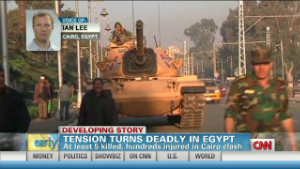 Tensions in Egypt turn deadly
Tensions in Egypt turn deadly 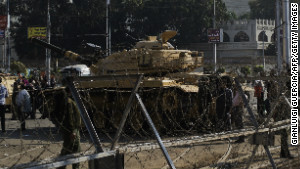 Chaos in Cairo
Chaos in Cairo 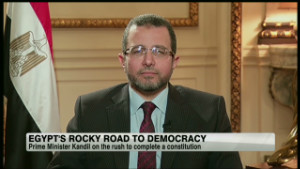 Egypt's prime minister on turmoil
Egypt's prime minister on turmoil And minutes after the speech ended, the Muslim Brotherhood headquarters in Cairo was "ablaze," state TV reported, citing witnesses. The Islamist group said on its website and Twitter that the building came under "a terrorist attack," with hundreds were surrounding it.
Yet by 1 a.m. Friday, there was no sign of a fire or significant damage to the building. Supporters from both sides were at the site, as were security forces between them and the headquarters.
Jihad Haddad, a senior adviser in the Freedom and Justice Party, the political wing of the Muslim Brotherhood that Morsy once led, wrote on Twitter that 36 Brotherhood and party offices were "destroyed" by opponents in the last two weeks. Banned under longtime President Hosni Mubarak, the Brotherhood is now Egypt's dominant political force.
On Twitter, the Islamist group has said it would hold opposition figures "fully responsible for escalation of violence & inciting their supporters."
Adel Saeed, a spokesman for Egypt's newly appointed general prosecutor, said Friday morning that Hamdeen Sabahi, Mohamed ElBaradei and Amr Moussa are being investigated for allegedly "conspiring to topple" the government. All three are well-known internationally -- with ElBaradei being a Nobel Peace Prize laureate and Moussa a one-time head of the Arab League -- and are now being probed for their role in the opposition against Morsy, who defeated all three in this year's presidential election.
Those taking part in the protests around the North African nation say the scenes are similar to those of the 2011 uprising that led to Mubarak's ouster. This time, they say, dissent is being vigorously stamped out by Morsy's backers in government and on the street.
Specifically, they spoke of thugs with knives and rocks chasing activists, presidential backers belittling opponents and pressure from various quarters to go home and be quiet.
"It's exactly the same battle," said Hasan Amin, a CNN iReporter.
A November 22 edict by Morsy, in which he made his decisions immune to judicial oversight until a new constitution is voted upon, set off the latest wave of political unrest. And it's been growing -- and growing more violent -- in recent days.
Ahead of the president's speech, opposition leaders were specific in what would mollify them: Morsy must roll back his edict granting himself expanded presidential powers and postpone the scheduled December 15 referendum on a proposed constitution, which they say doesn't adequately represent or protect all Egyptians.
Neither happened.
iReport: Bloody clashes around Egyptian Presidential palace
That fact, itself, isn't surprising. Morsy previously defended the edict as necessary to defend the revolution and his administration has insisted the proposed constitution was drafted legally and the referendum will go on as planned. If people vote it down, the president said Thursday night that he'd form a new assembly to draft another constitution.
Yet opposition activists haven't shown any indication that they trust Morsy on that or other counts. They accuse him of consolidating power for himself and the Muslim Brotherhood, in part by having an Islamist-dominated group push through the draft constitution.
"This is not what we asked for," one protester said. "It's a complete dictatorship."
The National Salvation Front, an umbrella group of opposition groups, including ElBaradei's Constitution Party, promised their fight is not over, calling for more mass protests Friday and claiming authorities "lost legitimacy," said the group, according to the semi-official al-Ahram newspaper.
These demonstrations would follow heated protests Thursday, including about 65 kilometers (40 miles) north of Cairo where a crowd tried to storm Morsy's home, according to the Interior Ministry. Police fired tear gas to disperse the group, and at least 20 protesters and six police officers were injured. Police arrested eight suspects carrying swords and clubs, the ministry said. Morsy was not at the home at the time.
Read more: Q&A: What's driving Egypt's unrest?
In the Maadi neighborhood of Cairo, someone also damaged the offices of the Freedom and Justice Part, the ministry said.
The scene was calm, but tense, outside the presidential palace in the capital, where the military parked tanks and armored personnel carriers, put up barbed-wire barricades and deployed soldiers.
In what looked like a war zone, piles of rubble and burned cars littered the streets and doors of nearby storefronts were smashed in.
Morsy also suffered a hit closer to home Thursday when Rafik Habib, the deputy head of the Freedom and Justice Party, resigned, party spokesman Ahmed Sobe said. Habib did not give a reason.
His resignation brings to five the number of presidential advisers who have left in the last two days. It is the first, however, from the Freedom and Justice Party.
Read more: Egyptian media strikes against President Morsy
Egyptian judges and media organizations also have staged strikes to show their displeasure with the situation. And 11 organizations representing lawyers, journalists, writers, actors, musicians and tour guides said Morsy and the Muslim Brotherhood were behind the violence, al-Ahram reported.
The group said it would call for Morsy's ouster if the administration failed to protect protesters and "fulfill the aspirations of the January 25 revolution," the newspaper said.
Vice President Mahmoud Mekki asked critics Wednesday to submit their proposals for improving the constitution, and Morsy invited political opponents to a meeting Saturday at the president palace.
But Morsy hasn't said he's ready to alter the constitution or the planned referendum date. And some Muslim Brotherhood officials have been more steadfast, as well as derogatory toward the opposition.
Muslim Brotherhood Secretary-General Mahmoud Hussein said Thusday protesters weren't interested in democracy. He accused them of using "crude and contemptible ways of expression, rather than (putting) their points across in a civilized manner."
While insisting he respects Egyptians' right to peaceful protest, Morsy spent a significant portion of his Thursday night speech blasting those he claims are behind the recent violence. He accused unspecified foreign and domestic sources of funding and fomenting the unrest, making specific reference to "corrupt" opposing forces tied to Mubarak's government.
"The deposed Mubarak regime will not be brought back to life under any circumstances," Morsy said, tweeted the Muslim Brotherhood.
Are you there? Share your story but stay safe. Read a version of this story in Arabic.
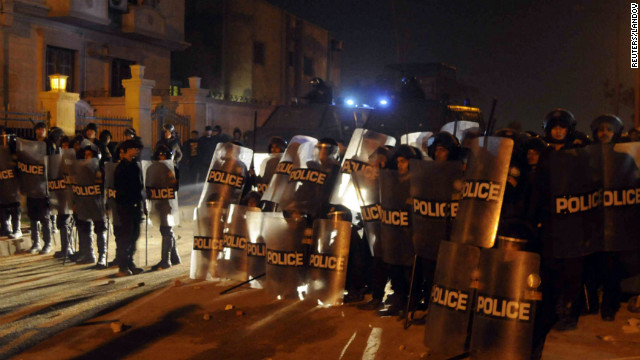 Riot police form a line as anti-Morsy protesters surge around the Muslim Brotherhood's headquarters in Cairo on December 6.
Riot police form a line as anti-Morsy protesters surge around the Muslim Brotherhood's headquarters in Cairo on December 6. 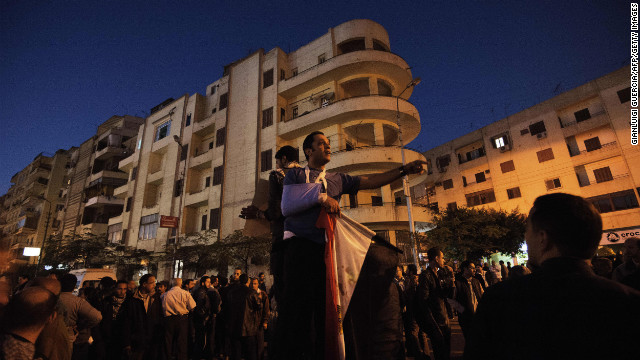 An anti-Mohamed Morsy protester shouts during a march to the presidential palace in Cairo, Egypt, on December 6.
An anti-Mohamed Morsy protester shouts during a march to the presidential palace in Cairo, Egypt, on December 6. 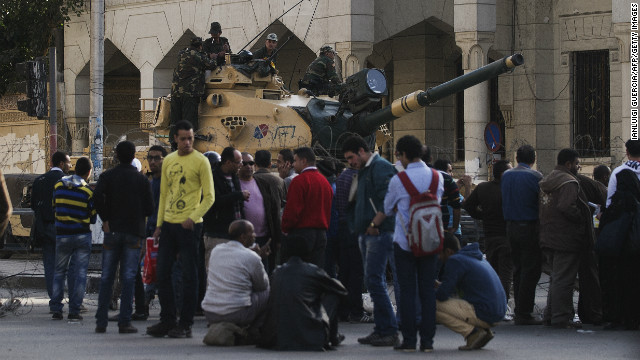 Protesters are blocked from approaching the the presidential palace by the Egyptian army on December 6 in Cairo.
Protesters are blocked from approaching the the presidential palace by the Egyptian army on December 6 in Cairo. 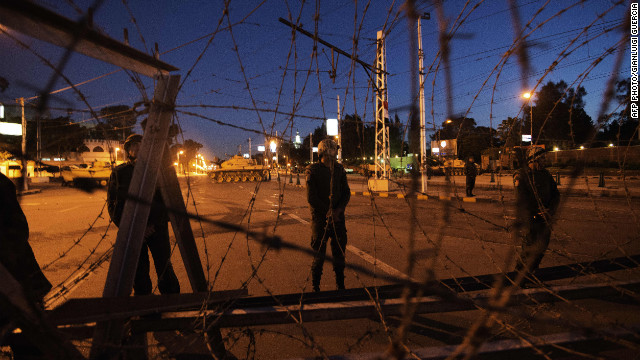 Egyptian soldiers stand outside the presidential palace in Cairo after setting up barbed wire barricades on December 6.
Egyptian soldiers stand outside the presidential palace in Cairo after setting up barbed wire barricades on December 6. 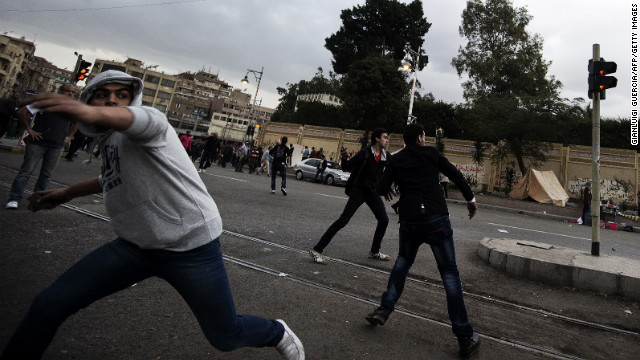 Supporters of Morsy clash with anti-Morsy protesters outside the Egyptian presidential palace on Wednesday, December 5, in Cairo.
Supporters of Morsy clash with anti-Morsy protesters outside the Egyptian presidential palace on Wednesday, December 5, in Cairo. 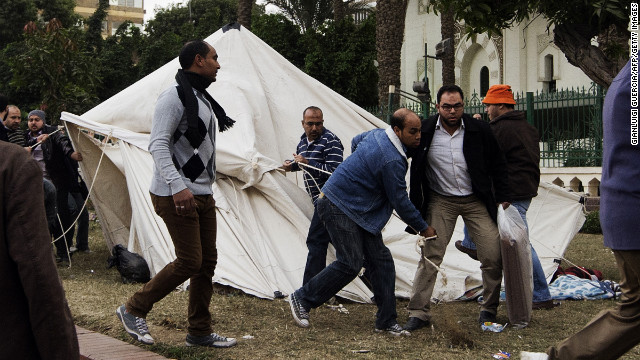 Members of the Muslim Brotherhood and Morsy supporters destroy tents of anti-Morsy protesters outside the presidential palace on December 5.
Members of the Muslim Brotherhood and Morsy supporters destroy tents of anti-Morsy protesters outside the presidential palace on December 5. 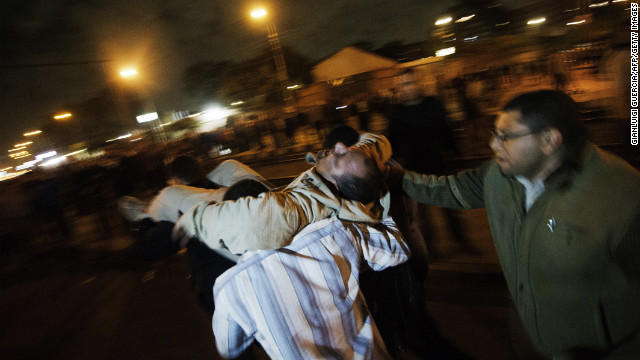 Morsy supporters carry an injured man to safety during clashes with anti-Morsy demonstrators on a road leading to the Egyptian presidential palace on December 5.
Morsy supporters carry an injured man to safety during clashes with anti-Morsy demonstrators on a road leading to the Egyptian presidential palace on December 5. 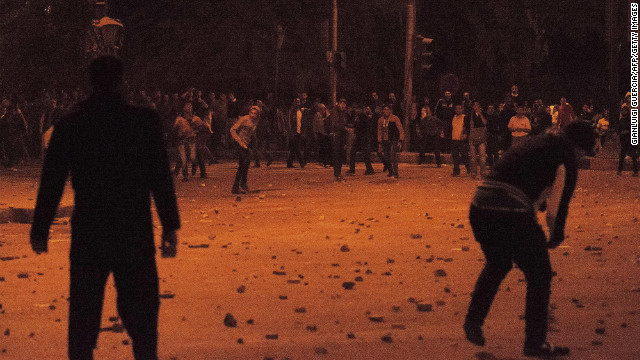 Members of the Muslim Brotherhood and supporters of Morsy clash with anti-Morsy demonstrators on a road leading to the Egyptian presidential palace on December 5.
Members of the Muslim Brotherhood and supporters of Morsy clash with anti-Morsy demonstrators on a road leading to the Egyptian presidential palace on December 5. 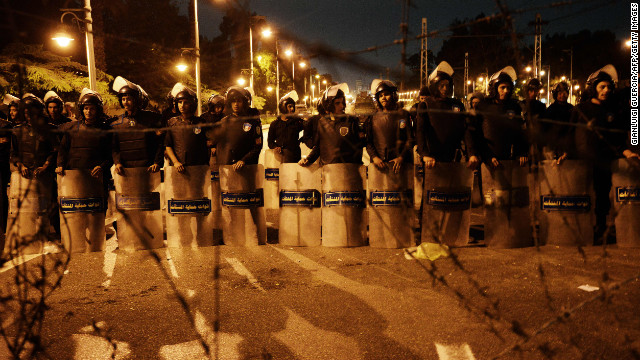 Egyptian riot police stand behind barbwire as thousands of Egyptian demonstrators march to the presidential palace in Cairo, Egypt, on Tuesday, December 4.
Egyptian riot police stand behind barbwire as thousands of Egyptian demonstrators march to the presidential palace in Cairo, Egypt, on Tuesday, December 4. 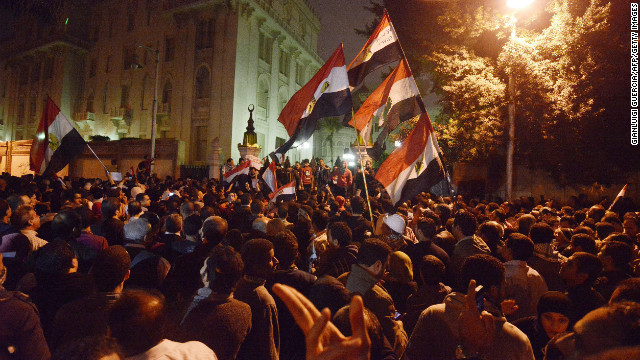 Tens of thousands of demonstrators encircled the presidential palace in Cairo after riot police failed to keep them at bay with tear gas on December 4.
Tens of thousands of demonstrators encircled the presidential palace in Cairo after riot police failed to keep them at bay with tear gas on December 4. 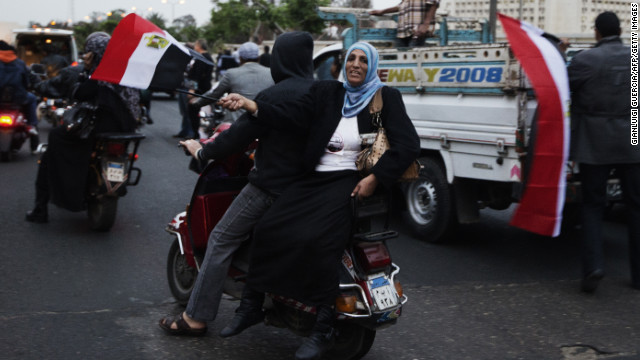 An Egyptian woman waves a national flag as demonstrators march to the presidential palace in Cairo on December 4.
An Egyptian woman waves a national flag as demonstrators march to the presidential palace in Cairo on December 4. 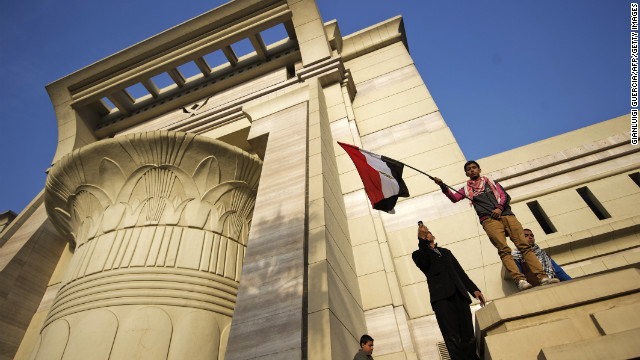 A Morsy supporter waves a flag outside the Supreme Constitutional Court as hundreds of supporters of the president protest on Sunday, December 2, in Cairo, forcing judges to postpone a hearing on a constitutional panel at the heart of a deepening political crisis.
A Morsy supporter waves a flag outside the Supreme Constitutional Court as hundreds of supporters of the president protest on Sunday, December 2, in Cairo, forcing judges to postpone a hearing on a constitutional panel at the heart of a deepening political crisis. 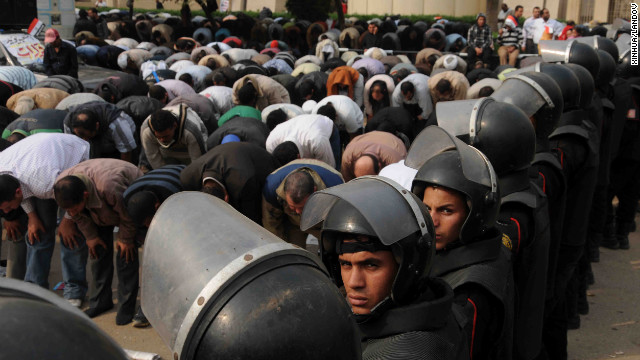 Supporters of Morsy pray outside the Supreme Constitutional Court on December 2.
Supporters of Morsy pray outside the Supreme Constitutional Court on December 2. 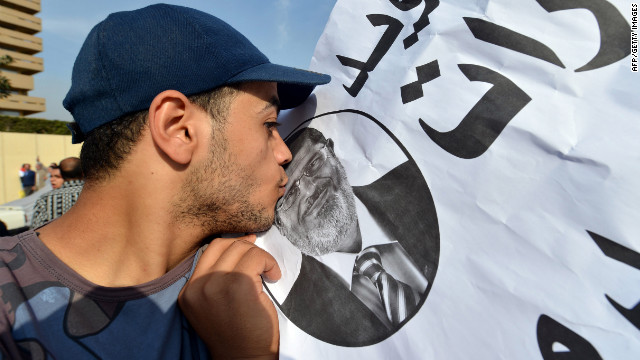 A man kisses a portrait of Morsy during a gathering of thousands of Islamists in front of Cairo University on Saturday, December 1.
A man kisses a portrait of Morsy during a gathering of thousands of Islamists in front of Cairo University on Saturday, December 1. 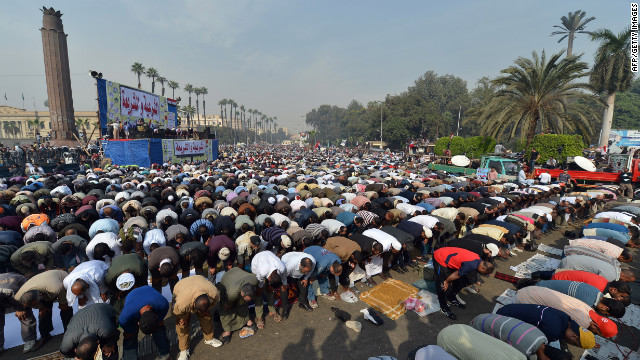 Thousands pray during a rally in support of Morsy in front of Cairo University on December 1.
Thousands pray during a rally in support of Morsy in front of Cairo University on December 1. 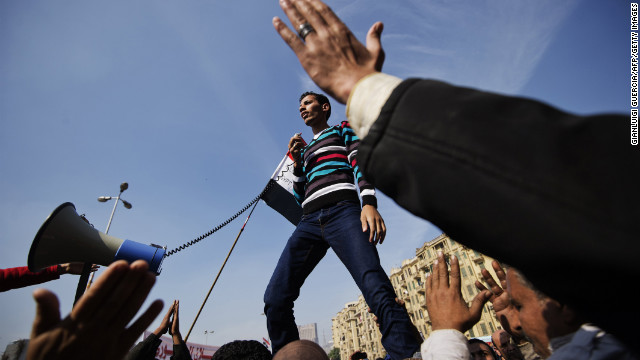 An Egyptian man delivers a speech as protesters gather in Cairo's Tahrir Square on Friday, November 30.
An Egyptian man delivers a speech as protesters gather in Cairo's Tahrir Square on Friday, November 30. 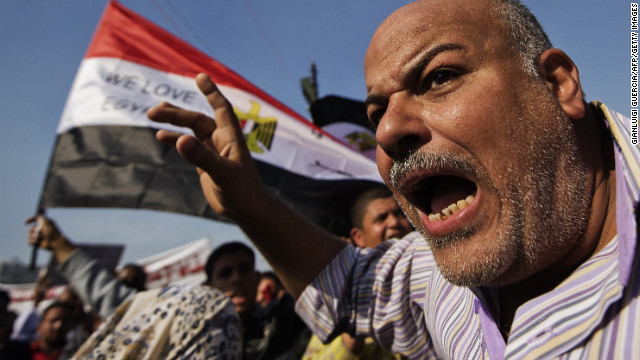 A man shouts as protesters gather in Tahrir Square on November 30.
A man shouts as protesters gather in Tahrir Square on November 30. 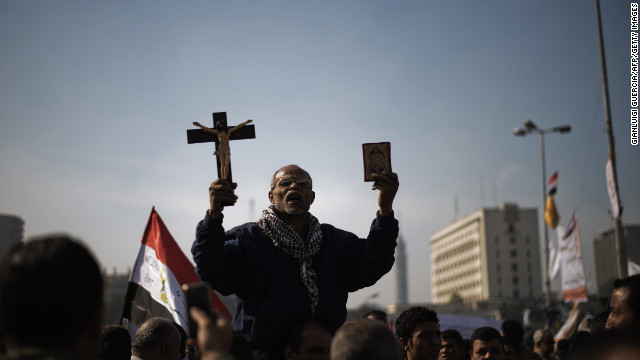 A man holds a copy of the Quran and a cross in Tahrir Square on November 30.
A man holds a copy of the Quran and a cross in Tahrir Square on November 30. 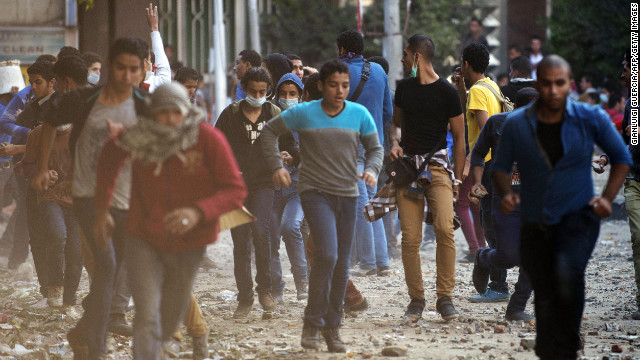 Protesters run from Egyptian riot police during clashes near Cairo's Tahrir Square on Wednesday, November 28.
Protesters run from Egyptian riot police during clashes near Cairo's Tahrir Square on Wednesday, November 28. 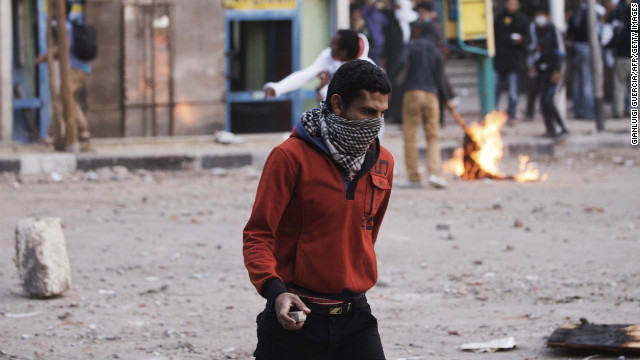 A protester carries a rock during clashes with police on Wednesday.
A protester carries a rock during clashes with police on Wednesday. 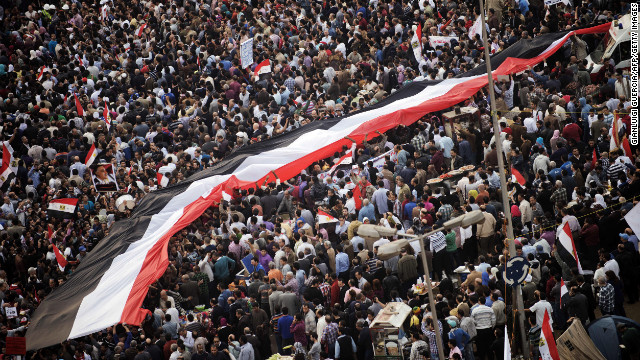 Egyptians carry a giant national flag as tens of thousands take part in a mass rally in Cairo on Tuesday, November 27, against a decree by President Mohamed Morsy granting himself broad powers.
Egyptians carry a giant national flag as tens of thousands take part in a mass rally in Cairo on Tuesday, November 27, against a decree by President Mohamed Morsy granting himself broad powers. 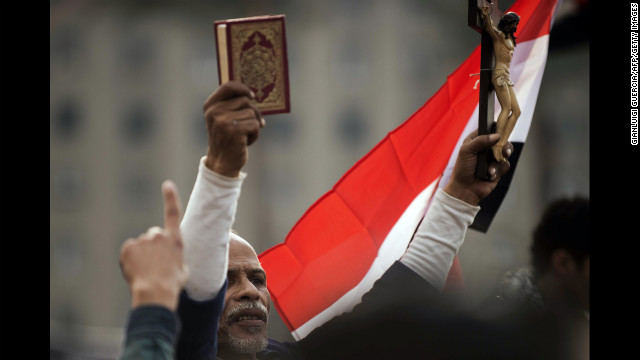 An Egyptian protester holds up a Quran and a figure of Christ on the cross during Tuesday's demonstration.
An Egyptian protester holds up a Quran and a figure of Christ on the cross during Tuesday's demonstration. 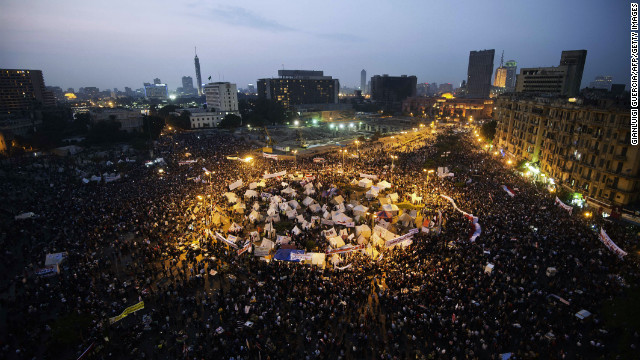 Protesters continue to rally in Tahrir Square on Tuesday.
Protesters continue to rally in Tahrir Square on Tuesday. 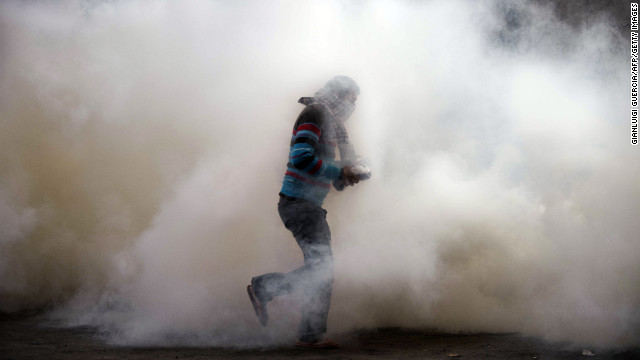 An Egyptian protester attempts to throw back a tear gas canister on Tuesday during clashes with riot police in Omar Makram Street, off Tahrir Square.
An Egyptian protester attempts to throw back a tear gas canister on Tuesday during clashes with riot police in Omar Makram Street, off Tahrir Square. 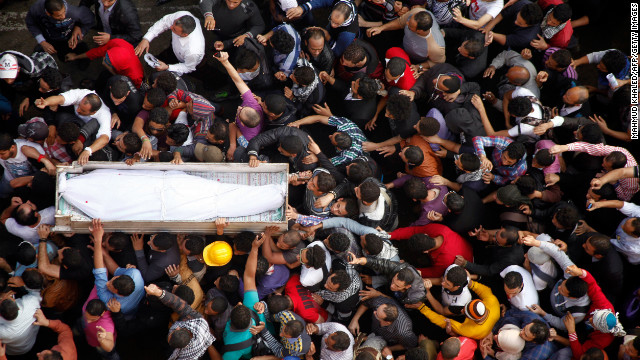 Activists in Cairo's Tahrir Square on Monday, November 26, carry the coffin of Gaber Salah, an activist who died overnight after he was critically injured in clashes in Cairo. Salah, a member of the April 6 movement known by his nickname "Jika," was injured last week during confrontations between police and protesters on Cairo's Mohammed Mahmud street.
Activists in Cairo's Tahrir Square on Monday, November 26, carry the coffin of Gaber Salah, an activist who died overnight after he was critically injured in clashes in Cairo. Salah, a member of the April 6 movement known by his nickname "Jika," was injured last week during confrontations between police and protesters on Cairo's Mohammed Mahmud street. 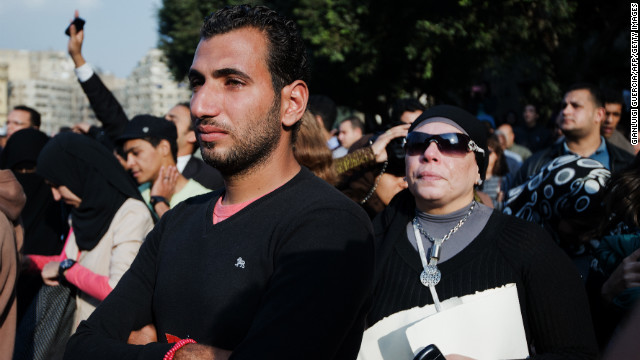 Thousands of activists attend the funeral of Gaber Salah on Monday.
Thousands of activists attend the funeral of Gaber Salah on Monday. 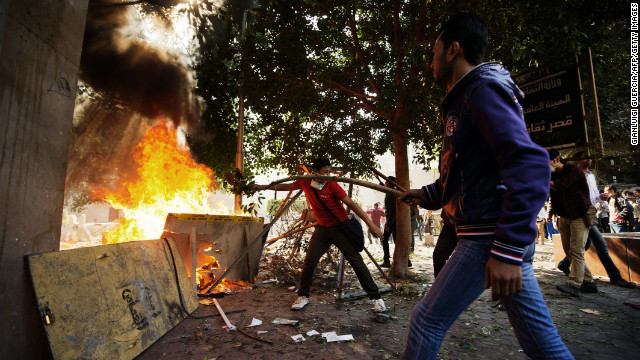 Protesters clash with Egyptian police at Simon Bolivar Square on Sunday, November 25, in Cairo. Egypt's powerful Muslim Brotherhood called nationwide demonstrations in support of Islamist President Mohamed Morsy in his showdown with the judges over the path to a new constitution.
Protesters clash with Egyptian police at Simon Bolivar Square on Sunday, November 25, in Cairo. Egypt's powerful Muslim Brotherhood called nationwide demonstrations in support of Islamist President Mohamed Morsy in his showdown with the judges over the path to a new constitution. 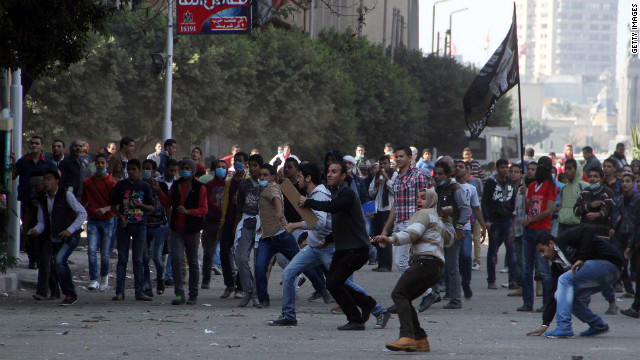 Egyptian protesters hurl stones at police at Tahrir Square on Sunday.
Egyptian protesters hurl stones at police at Tahrir Square on Sunday. 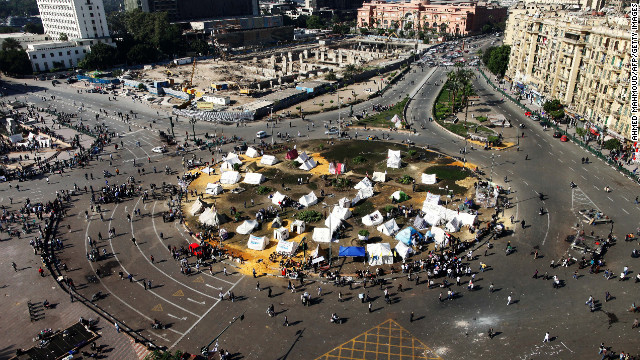 Protesters gather at sit-in tents in Tahrir Square on Sunday.
Protesters gather at sit-in tents in Tahrir Square on Sunday. 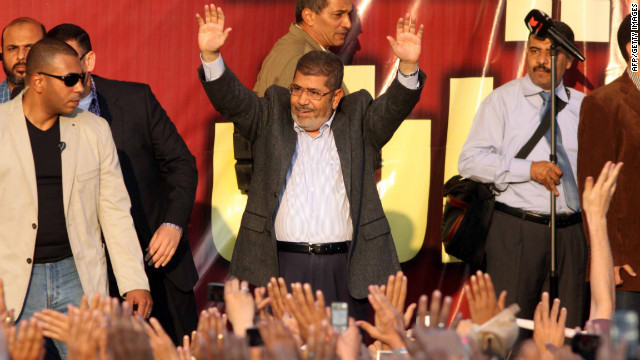 Egyptian President Mohamed Morsy waves to supporters in front of the presidential palace in Cairo on Friday, November 23. Thousands of ecstatic supporters gathered outside the presidential palace to defend their leader against accusations from rival protesters that he has become a dictator.
Egyptian President Mohamed Morsy waves to supporters in front of the presidential palace in Cairo on Friday, November 23. Thousands of ecstatic supporters gathered outside the presidential palace to defend their leader against accusations from rival protesters that he has become a dictator. 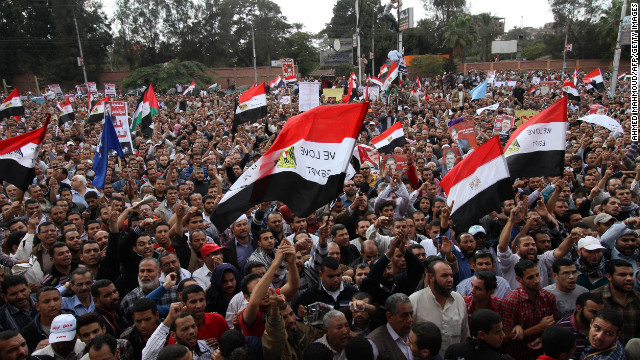 Morsy supporters gather outside the presidential palace in Cairo on Friday. Morsy insisted that Egypt was on the path to "freedom and democracy," as protesters held rival rallies over sweeping powers he assumed that further polarized the country's political forces.
Morsy supporters gather outside the presidential palace in Cairo on Friday. Morsy insisted that Egypt was on the path to "freedom and democracy," as protesters held rival rallies over sweeping powers he assumed that further polarized the country's political forces. 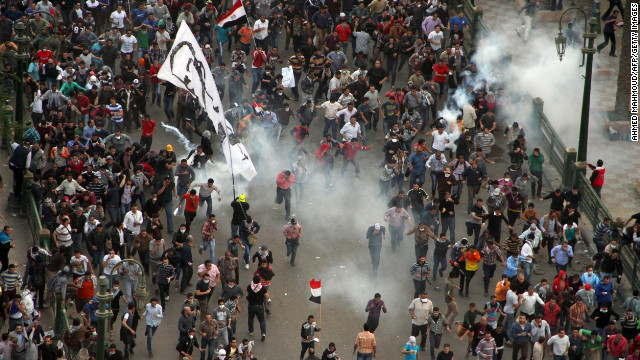 Protesters demonstrating against Morsy run from tear gas fired by Egyptian riot police during clashes in Cairo's Tahrir Square on Friday.
Protesters demonstrating against Morsy run from tear gas fired by Egyptian riot police during clashes in Cairo's Tahrir Square on Friday. 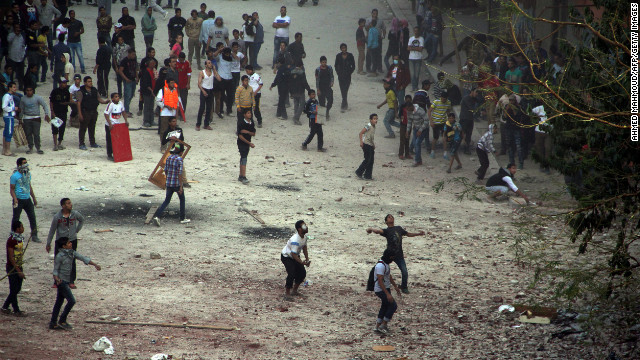 Egyptian protesters throw rocks toward riot police on Friday
Egyptian protesters throw rocks toward riot police on Friday 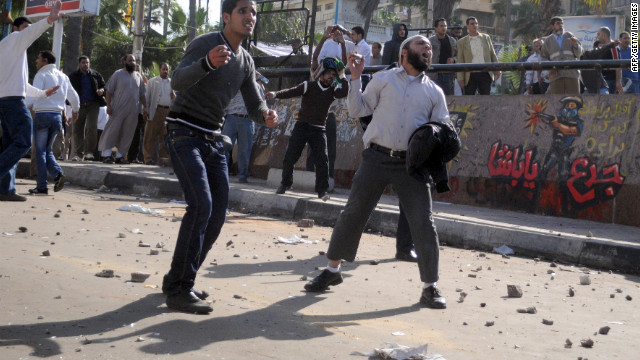 Egyptian supporters and opponents of Morsy clash in the coastal city of Alexandria on Friday.
Egyptian supporters and opponents of Morsy clash in the coastal city of Alexandria on Friday. 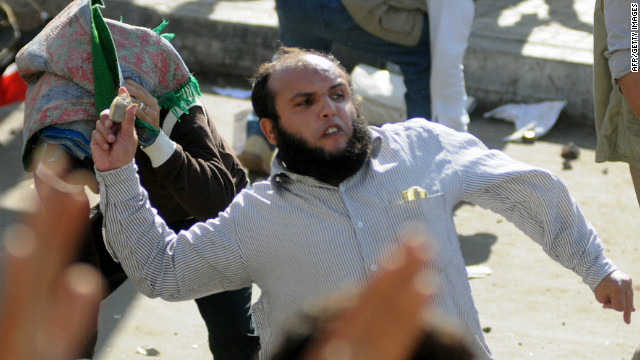 A man throws a rock during clashes in Alexandria on Friday.
A man throws a rock during clashes in Alexandria on Friday. 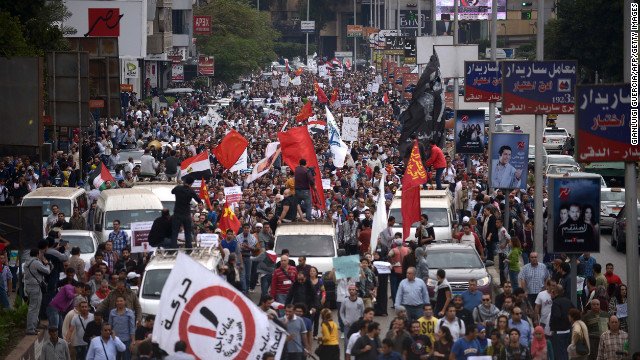 Thousands of demonstrators march through the streets of Cairo to protest against Morsy on Friday.
Thousands of demonstrators march through the streets of Cairo to protest against Morsy on Friday. 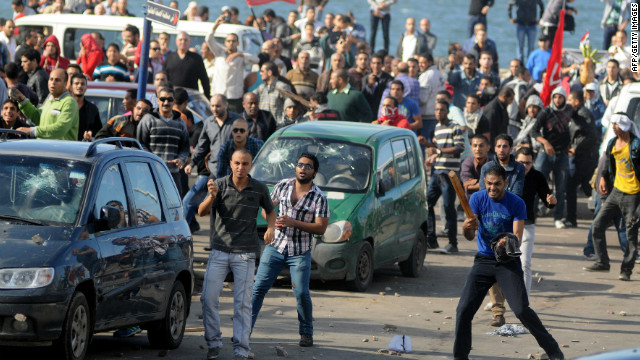 Clashes rocked the coastal city of Alexandria on Friday. Egyptians protest over presidential powers Egyptians protest over presidential powers Egyptians protest over presidential powers Egyptians protest over presidential powers Egyptians protest over presidential powers Egyptians protest over presidential powers Egyptians protest over presidential powers Egyptians protest over presidential powers Egyptians protest over presidential powers Egyptians protest over presidential powers Egyptians protest over presidential powers Egyptians protest over presidential powers Egyptians protest over presidential powers Egyptians protest over presidential powers Egyptians protest over presidential powers Egyptians protest over presidential powers Egyptians protest over presidential powers Egyptians protest over presidential powers Egyptians protest over presidential powers Egyptians protest over presidential powers Egyptians protest over presidential powers Egyptians protest over presidential powers Egyptians protest over presidential powers Egyptians protest over presidential powers Egyptians protest over presidential powers Egyptians protest over presidential powers Egyptians protest over presidential powers Egyptians protest over presidential powers Egyptians protest over presidential powers Egyptians protest over presidential powers Egyptians protest over presidential powers Egyptians protest over presidential powers Egyptians protest over presidential powers Egyptians protest over presidential powers Egyptians protest over presidential powers Egyptians protest over presidential powers Egyptians protest over presidential powers Egyptians protest over presidential powers HIDE CAPTION << <
Clashes rocked the coastal city of Alexandria on Friday. Egyptians protest over presidential powers Egyptians protest over presidential powers Egyptians protest over presidential powers Egyptians protest over presidential powers Egyptians protest over presidential powers Egyptians protest over presidential powers Egyptians protest over presidential powers Egyptians protest over presidential powers Egyptians protest over presidential powers Egyptians protest over presidential powers Egyptians protest over presidential powers Egyptians protest over presidential powers Egyptians protest over presidential powers Egyptians protest over presidential powers Egyptians protest over presidential powers Egyptians protest over presidential powers Egyptians protest over presidential powers Egyptians protest over presidential powers Egyptians protest over presidential powers Egyptians protest over presidential powers Egyptians protest over presidential powers Egyptians protest over presidential powers Egyptians protest over presidential powers Egyptians protest over presidential powers Egyptians protest over presidential powers Egyptians protest over presidential powers Egyptians protest over presidential powers Egyptians protest over presidential powers Egyptians protest over presidential powers Egyptians protest over presidential powers Egyptians protest over presidential powers Egyptians protest over presidential powers Egyptians protest over presidential powers Egyptians protest over presidential powers Egyptians protest over presidential powers Egyptians protest over presidential powers Egyptians protest over presidential powers Egyptians protest over presidential powers HIDE CAPTION << <
{ 0 comments... read them below or add one }
Post a Comment